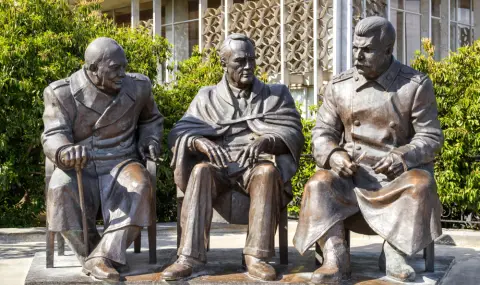On December 1, 1943. in Tehran, a conference with the participation of the leaders of the USA, the USSR and Great Britain - Franklin Roosevelt, Joseph Stalin and Winston Churchill - was completed, which was the first with the participation of the three and from which the determination of the post-war order in the world began. For three days, Tehran was completely blocked by troops and special services. All media have been suspended in the city, telephones, telegraphs and radio communications have been shut down. Even the families of the Soviet diplomats were temporarily “evacuated” outside the area of the upcoming negotiations.
The conference opened with a plenary session on November 28 at 4:00 p.m. in one of the halls of the Soviet embassy, where the meetings, meetings, and official and informal talks were subsequently held. The embassy of the Soviet Union is the largest and has the most premises, and it is located next door to the British one.
Unfortunately, the United States embassy was too far away, and the Americans decided for themselves that it was extremely worrisome from a security point of view for Roosevelt's motorcade to pass through the streets of Tehran several times a day.
Stalin offered hospitality, and Roosevelt and his entourage were provided with suitable apartments. Visibly moved, Roosevelt accepted and thanked profusely. Churchill could not hide his jealousy because the Soviet embassy in Tehran, if only for a few days, became the world's geopolitical center. The random fact amuses the guests after they notice a shock at Churchill.
The main subject of discussion is the opening of a second front in Europe, and the final strategy in the war with Nazi Germany, its allies and satellites is determined at the conference. Roosevelt and Churchill agree on the second front in Western Europe, i.e. called operation "Overlord" to begin in May 1944. in parallel with operation “Enville” in southern France. The operation in France was later postponed to August 15, 1944
Stalin, for his part, committed himself to the USSR joining the war with Japan within three months of the end of the war in Europe. The three countries also agree that their military forces will cooperate as closely as possible in the name of common goals. It was decided to demand responsibility from those responsible for inciting and waging the Second World War.
At Stalin's insistence, the borders of post-war Poland were determined along the line of the Oder and Nysa rivers - the so-called called “Curzon Line”. At the same time, a decision was made to actively support the Yugoslav partisans with weapons, with equipment and food, with information about the enemy's operations.
However, the big three failed to achieve one of the goals set by the conference - to make Turkey enter the war on the side of the Allies, and until the end it remained neutral. Instead, all three statesmen unanimously decided to guarantee the independence of Iran after the end of the war.
A request was made that after the war the world would be ruled by four countries – USSR, USA, Great Britain and France, acting under the auspices of a new international organization.
On November 29, before the second plenary session, Churchill presented Stalin with a sword forged from 12-inch steel, saying: “I have the honor on behalf of His Majesty the King of England to present this sword to you and ask you to hand it over to the citizens of Stalingrad. With their unparalleled heroism they...”
With great enthusiasm, the British Prime Minister uttered words of gratitude and appreciation to Russia and to its soldiers who turned the tide of the war at Stalingrad and Kursk, saving not only Britain but the world.
The Tehran conference is also remembered for a dramatic assassination attempt against the leaders, planned by German intelligence, but discovered and foiled. The meeting actually continued the line begun in Cairo a few months earlier and subsequently continued at the Yalta and Potsdam conferences in 1945.
December 1, 1943 In Tehran, Roosevelt, Stalin and Churchill decided the fate of Hitler
A request was made that after the war the world would be ruled by four countries - the USSR, the USA, Great Britain and France
Dec 1, 2024 03:13 380
